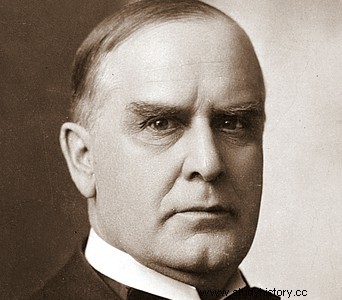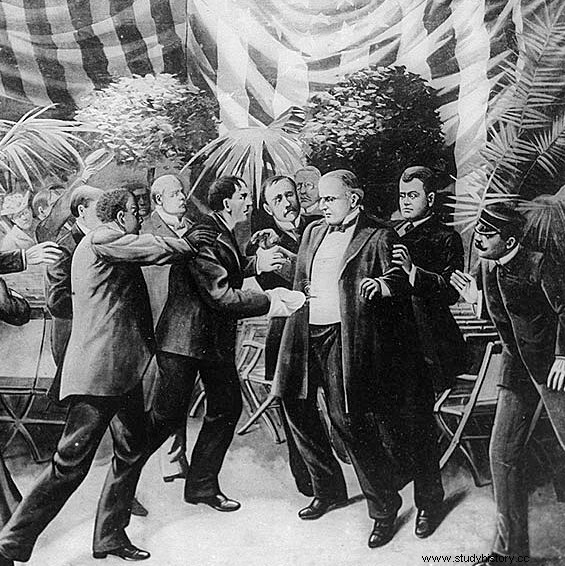The frontier of the Americas as seen by whites disappeared in the 1890s. Still, the theory of expansion does not stop, and the United States will expand overseas in search of further territory.
William McKinley is a president who symbolizes such American imperialism.
The Last Civil War President
William McKinley was born in 1843 in Oio. He can be said to be one of the presidents from Ohio that has continued since the Civil War.
In fact, after the Civil War, Rutherford B. Hayes, James Garfield, and Benjamin Harris were from Ohio, in contrast to many presidents from Virginia before the Civil War.
This would indicate that American politics has changed significantly since the Civil War. The power in the south weakened, and the power in the north became stronger. It was also a time when the Republicans, with the support of the wealthy and industrial capitalists, were imposing high tariffs to weaken the sales force of foreign products, which led to significant economic growth in the United States.
McKinley's ancestors were Scottish immigrants who emigrated to the United States in the first half of the 18th century, and McKinley himself was born as the seventh child of nine siblings.
He said he entered Allegheny University in 1860 but did not earn a degree due to the Civil War.
McKinley participated in the Civil War as a graduate, and his superior was Rutherford B. Hayes, who later became president.
Hayes highly valued McKinley and was eventually able to be promoted to Major.
After the war, he studied law and worked as a lawyer from 1867 and was an Ohio prosecutor from 1869 to 1871.
After that, he became a lawyer again, became a staff member of former superior Rutherford B. Hayes, served as Governor of Ohio, a member of the Ohio elected federal parliament, etc. Will be.
25th President

When McKinley became president, he embarked on extreme protectionist trade according to Republican tradition, enacted the Tingley Tariff Law, which imposes a high tariff of 57% on average, and then promoted American imperialism policy in the midst of criticism from home and abroad.
It can be said that this is an expanded interpretation of the American expansionism "Manifest Disteny".
During this period, the book "The Impact of Maritime Forces on History" written by a person named Alfred Thayer was influential, and the tone that the one who controls the sea controls the world became stronger.
Under such circumstances, Cuba in the Caribbean sought independence from Spain. McKinley supports this. In 1898, when the USS Maine, which was moored off the coast of Cuba, exploded and sank, McKinley declared war on Spain, and the Spanish-American War broke out.
Spain, which once ruled the seven seas, was no longer an enemy of the United States. The country that once "discovered" the Americas lost to the country that "discovered" it. I lost without being a partner at all.
The truth of the Maine case is unknown, but the United States will intervene in the war many times in the future because of a suspicious case. The Lusitania incident, the Pearl Harbor incident, the Gulf of Tonkin incident, and the United States are constantly being attacked by enemy nations and fighting back. Too unnatural.
By the way, it is said that the X-rays discovered by Dr. Roentgen were very useful during the Spanish-American War.
The United States had grown into a great power on par with European countries.
In the same year, Hawaii was annexed, and at the Spanish-American War peace conference concluded in Paris, the United States occupied the Philippines, Guam, and Puerto Rico, and part of Cuba was made a permanent concession, and the Guantanamo base still exists at that point. There is.
However, the Philippine Independence Aguinaldo claimed independence by being released from Spanish rule, and McKinley did not admit this, and the United States would start the Philippine-American War with the Philippines.
As a matter of course, the result is an overwhelming victory for the United States, and the United States will take this opportunity to aim for expansion into China.
However, China has already entered a period of division by the great powers due to the Sino-Japanese War and the Boxer Rebellion, and the United States has been completely delayed. There, John Hay, Secretary of State McKinley, issued a declaration of open doors insisting on free trade with China, insisting on the territorial integrity of the Qing dynasty, and deepening the conflict with Japan and Russia.
The end of William McKinley

McKinley was reelected and had entered his second term, but was unable to successfully complete his second term.
In 1901, he was assassinated. He is 58 years old.
The culprit was an anarchist named Leon Frank Czolgosh.
Personal evaluation of McKinley
During his time as a lawyer, McKinley was in charge of a strike at a mine run by businessman Mark Hanna. McKinley defended the miners' side, which is unusual for a Republican, and when they later tried to pay the defense costs, he dismissed it as "I don't want to!".
It's a McKinley-like episode that was hard-lined externally but kind to the American people.
When he was assassinated, Vice President Theodore Roosevelt became president. If you think about it, if Theodore Roosevelt didn't become president at this time, his son-in-law Franklin Roosevelt might not have become president.
History is a product of coincidence.
Even in Japan, there was a statement that "it is no longer postwar", but in the time of McKinley, the United States finally passed the post-Civil War restructuring period and entered a new era of imperialism. ..
As a result, the world will be in an era where Britain, France, Germany, Japan, Russia, and the United States will compete, and the era will advance to the world war where each country collides.
In that sense, McKinley can be said to be the president at a turning point in history.
